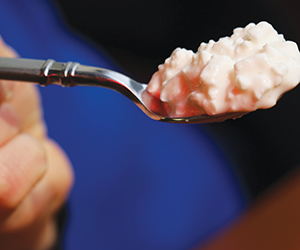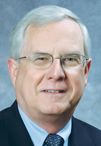By JULIE MINDA
For decades, health care providers have urged people to fill out advance care directives to specify the type of health care services they would want if advanced illness, traumatic injury or cognitive decline prevents them from speaking on their own behalf.
While the Catholic health ministry promotes planning for such circumstances, and while it encourages people to complete advance directives, there are times when the wishes of patients and their loved ones can come into conflict with Catholic teaching. This can be the case when it comes to the hand-feeding of patients with advanced dementia who are no longer capable of feeding themselves.

Cottage cheese is an example of a soft food that's easy to chew and swallow for someone who requires hand-feeding, according to information from Providence St. Joseph Health.
Providence St. Vincent Medical Center
Experts connected with Catholic health care say it's important for ministry providers to be prepared for the possibility that the advance directives of patients with dementia — or the wishes of the people making decisions for those patients — will call for the premature discontinuation of hand-feeding before a patient is actively dying. If the feeding was providing benefit and was not excessively burdensome, the presumption in the Catholic facility would be to continue it.
Requests for halting feeding are "becoming more and more common — and more and more people are advocating the voluntary stopping of eating and drinking — and this could be a challenge for Catholic health care," says Ron Hamel, a retired CHA senior ethicist. He says ministry providers "should become educated and prepared and — after wide consultation on how to deal with these concerns — they should develop policies and procedures" for handling these situations.

Hamel
Silver tsunami
According to the Alzheimer's Association, there are 5.7 million Americans living with Alzheimer's and that number is projected to rise to nearly 14 million by 2050. According to information from an October 2017 article in the journal Demography, "the estimated average age of onset of dementia in the United States is 83.7 years." The American Psychological Association says dementia affects about 37 percent of the population above age 90. Census Bureau reports indicate that the number of Americans who are 90 years old or older was projected to more than quadruple between 2010 and 2050.
Carol Taylor is a professor of nursing and medicine at Georgetown University School of Nursing & Health Studies and a senior clinical scholar at the Kennedy Institute of Ethics. She says this "coming 'silver tsunami' will result in more requests to not feed, and I believe we need to be thinking carefully about how we respond."

Taylor
Nutrition and hydration can become a significant concern for people with dementia because "in the later stages of dementia, different parts of the brain slowly stop working and eating and drinking become more difficult," according to a patient education resource from the University Health Network of Toronto. Patients may forget how to eat or may lose control of functions like chewing and swallowing.
When this happens, clinicians may consider recommending tube feeding patients, but it does not always improve the quality of life for people with dementia and it can introduce a host of serious, even fatal side effects, such as patient pain, diarrhea and aspiration pneumonia. Clinicians generally prefer that patients with advanced dementia be hand-fed by a caregiver trained in safe practice.
Instructions
But patients or those making decisions for them may balk at the prospect of hand-feeding when the patient appears to have severely compromised quality of life. Taylor says, "Behind the thinking today when family members request that a loved one with dementia not be fed, or when someone with a family history of dementia wants to use advance care planning to specify at what point they would not want to be hand-fed, is an understandable abhorrence to the experience of living with advanced dementia.
"I have yet to encounter someone who wants to die of a prolonged debilitating dementia," she says. "And, yet, are these not the very vulnerable individuals to whom we have pledged our care and commitment?"

Fr. Bouchard
For the ministry, questions around hand-feeding can come up in many different care settings, including long-term care sites and their memory units, hospice programs and home health programs. The goal for ministry providers is to serve the best interest of the patient and to follow that person's advance directives — so long as doing so does not conflict with the Ethical and Religious Directives for Catholic Health Care Services, says Fr. Charles Bouchard, OP, CHA senior director of theology and sponsorship.
Fr. Bouchard says the presumption in the Catholic directives is toward providing food and hydration, if a patient can safely swallow, and the provision of the food and drink are of benefit and not excessively burdensome to the patient. Hamel adds that it is unethical for nutrition and hydration to be stopped to intentionally hasten death.

Hibner
However, says Nate Hibner, CHA director of ethics, ceasing to eat and drink is a natural part of the dying process. If a person is at the end of life, it may be appropriate to halt food and drink and focus entirely on providing comfort care.
Practical application
Nicholas Kockler is regional director of Providence St. Joseph Health's Center for Health Care Ethics, and Dr. Gregg VandeKieft is associate medical director for the Institute for Human Caring at Providence St. Joseph. Both assist Providence St. Joseph facilities and clinical staff with ethics consults, protocol development, palliative care consultation and clinician education on ethical issues in caregiving. Their purview includes matters related to requests to halt feeding.

Kockler
Kockler says the discernment around hand-feeding decisions must take an individual's circumstances into account. For instance: a patient capable of making decisions could refuse food and drink; a patient not capable of decision making could have a directive not to be fed at a certain juncture; the patient could have symptoms of appetite loss or a swallowing disorder and could be making motions that indicate an aversion to eating; the intake of food could be causing a physical burden to the patient; or a surrogate decision maker could request that feeding be stopped. Each situation would invite a different ethical analysis.
VandeKieft says that when patient and family desires conflict with Catholic health care protocol in the clinical environment, providers and ethicists should weigh the clinical, ethical and legal implications of continuing or halting the provision of food and drink. The goal should be to try to reach common ground with the patient or the person's decision-makers, if possible.

VandeKieft
Kockler notes that when delving into patients' cases in this way, it is important to get at what is behind requests for food withdrawal. Often, underneath such requests are concerns about a patient's level of vulnerability, loss of autonomy and quality of life. Kockler says that refusing food and drink — or requesting discontinuation for a loved one — "in itself could be a symptom of how our society does not always take care of elders."
Be prepared
Ethicists who spoke to Catholic Health World say facilities can try to head off concerns by being clear with patients and families — before patient admission — about feeding protocols for patients who can no longer feed themselves. An administrator should review any directives patients have drawn up about these matters to ensure there is no conflict with facility protocol and initiate a discussion to learn the perspectives of patients and families. The facilities should educate staff — and particularly clinicians — about concerns that can arise and how to approach them.
Most important in all this work, says Kockler, is that "we need to recognize that these patients are people with intrinsic dignity who deserve our care and respect. … We as a society have to think through how we are caring for these patients — and that needs to be in a compassionate way."